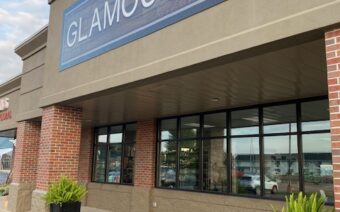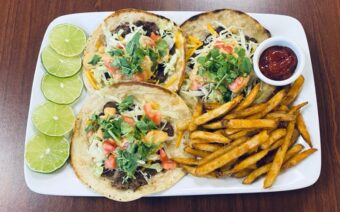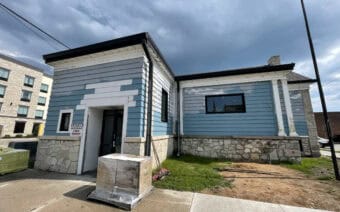
May 17, 2023
GREEN BAY – Green Bay residents may have heard that The Cannery – a public market and restaurant in downtown Green Bay, which closed in part due to the COVID-19 pandemic – is reopening its doors in July.
However, The Greater Green Bay Chamber announced the space located at 320 North Broadway (Suite 110) is going to run a bit differently than before – relaunching as a test kitchen of sorts.
Josh Rogers, the incubator director, said The Cannery is shifting its business model from a public market to a food incubator and test kitchen in collaboration with Proof, a Chattanooga, Tennessee-based company that provides industry education and mentorship through online programs, workshops and one-on-one coaching for emerging food and beverage companies.
“This is not going to be The Cannery that everybody is familiar with,” he said. “We wanted to keep The Cannery brand, because… we wanted to keep that public sentiment going, and then (also) offer an awesome experience in its place, with the same name, but done a little bit differently.”
Instead of operating as a standalone business with restaurant food and goods available for purchase, Rogers said The Cannery will feature multiple businesses at one time, serving as a place for food entrepreneurs to launch their new idea or elevate an idea they’ve been executing already.
“We are a restaurant incubator, so we don’t take people who have been in the industry for a long time and bring them into the space,” he said. “What we do is try to find new entrepreneurs, talented (bakers) and chefs and give them a space that has a lower barrier of entry, so that they can focus on creating their brand and learning the business side of things, which is usually where a lot of restaurants fall short.”
Rogers said the restaurant incubator will provide prospective and active food entrepreneurs with guidance and insight that can help them stay sustainable as a business.
“There are a lot of talented cooks, but they might not know exactly how to run a full inventory the way it needs to be done or run a profit loss statement,” he said. “We offer the tools to teach them all those pieces, so eventually they can graduate out of the incubator and open up their own brick and mortar, food truck, event space or catering business.”
Multiple approaches for entrepreneurs
For food entrepreneurs who may be interested in the program, Rogers said there are a variety of ways to use the resources of this new version of The Cannery.
“If they wanted to actually be in the food hall, that’s one way that we do things if they already have a business going and they’re just looking for a little bit more assistance,” he said. “We also have courses like our restaurant accelerator programs, our restaurant resiliency programs and our consumer-packaged goods accelerators and resiliencies. The courses are very detailed, and they take all the knowledge that the team has learned over our 100-plus years in the industry and distilled that down into pieces of information that you’re really going to need to know in order to be successful and have a sustainable business.”
The different courses allow for a wide range of food entrepreneurs to get involved, but Rogers said the intent of the program is to help those who already have some foundational kitchen knowledge.
“If they’re looking to get into the incubator itself, we are not going to be teaching people how to cook,” he said. “That’s not the goal of the incubators.”
Rogers said the incubator is more interested in people who already have an idea and a semblance of a business plan.
“We don’t want somebody who has just a spark of an idea,” he said. “We’re looking for those self-starters who already have that idea pushed out a little bit more so that we can help them tighten it up and get into the space.”
A growing region for the food industry
After engaging in market research, Rogers said The Greater Green Bay Chamber and Proof determined that the Northeast Wisconsin region is primed for a food incubator of this nature.
“Gone are the days where burger spots and cheese curds are all people want in Northeast Wisconsin,” Ron Franklin, chamber director of entrepreneurship, said. “People are moving away from that as the population becomes more diverse and as we attract more people from outside the Green Bay area.”
Franklin said it’s not just a growing appetite for newness in the local food industry, but the demand is also coming from those looking to experience the food of their own culture.
“People want more diverse food, they want more authentic foods, like authentic Mexican, Chinese, Indian, European or Ethiopian,” he said. “There are all sorts of different foods people want to try, but they don’t know of, or they can’t find anyone that also relocated to this area from their native countries. They can’t find anything that’s close to their home food. Being able to have that here, it’s growing the community, and it’s a fantastic thing to have.”
Franklin said there are several other factors post-pandemic that are pushing the readiness of the new Cannery approach.
“People are starting to socialize more, get back into the community and go out to eat,” he said. “As we start to see the change in the economy, we also start to see growth in entrepreneurial activities and part of that is in the restaurant business. We have people that honed skills during COVID, such as making jerky or making sauces, those sorts of things that people are wanting to turn into a semiprofessional or professional full-time role.”
The new Cannery, Franklin said, will give these home-based businesses a unique opportunity to take their business to the next level.
//17bec5072710cda5b8dd81b69f4c6e58.cdn.bubble.io/f1684355584466x219925576603141150/richtext_content.webpJosh Rogers said The Cannery name was kept for the test kitchen because it is one the community already knows. Submitted Photo
“We’ve had a lot of interest from these food-based businesses,” he said. “The fact that we now have a programming resource for them to be able to grow these businesses is fantastic. There are no other food training programs in our region that have the ability to do and help them the way we can.”
Rogers shared Franklin’s sentiment.
“We are here in Green Bay because it has that local community feel,” he said. “And whenever we have somebody come in here to the incubator and grow the following, it’s people that they see, most likely, every single day.”
Rogers said it’s a factor that can lead to food business retention in the area.
“(Businesses) can graduate out of the program and they’re most likely going to move down the street or somewhere to the other side of town and open up shop in the same city,” he said. “Then that same following can follow them along and support them as they continue to grow. It gives the chance for the community to grow in a local way, where it’s not just a chain coming in and taking over with five or six locations.”
Contributing to a growing local industry
For Rogers, he said he feels this sort of project reflects what’s important to him when it comes to working in the industry.
“I’m at the point in my career where now it’s my turn to give back,” he said. “That’s what the whole team at Proof is about… It’s our duty to take all the knowledge and all the skills we’ve picked up and pass that along to the next generation of restaurateurs and chefs that are coming through.”
The Proof team has lived out the experiences of prospective and active food entrepreneurs, Rogers said, and believes they are filling a gap in the food and beverage industry.
“Every single person on the team has either been in management for a long time or been in the corporate world for a long time, or has run their own restaurants,” he said. “We’ve been where every single person that’s coming through is at. We wish we had some of these resources… when we were opening.”
Rogers said the experience he obtained in the food industry in his hometown of Fort Worth, Texas gives him hopes of creating and sustaining a food community in the Green Bay area.
“The food and beverage community in Fort Worth is something unlike anywhere else I’ve ever seen,” he said. “It’s so tight knit, and there are loads of chefs that will open their own restaurant. Then on their very few off days, they’ll be sitting at one of their buddies’ restaurants… They do all these fundraising and charity events together. There will be events for the food bank, and you’ll see this same group of 15 or 20 or 25 chefs.”
Rogers said he believes that The Cannery can help create that food community here in Northeast Wisconsin.
“It would be awesome to use The Cannery as a way to start building that community, even more so than what I’ve seen already,” he said. “I’ve already seen a bit of that community. To have these people start in the same kitchen and then grow out of this kitchen to other parts of the city, and then stay connected as they grow – it would be an awesome thing to see.”
A thriving food and beverage industry, Rogers said, can lead to a thriving community overall.
“Food is a great connector for everyone,” he said. “Whenever the food and beverage industry is thriving, the community is also thriving. There’s a sense of togetherness in that community because people can really bond over food.”
Rogers said The Cannery will reopen as an incubator in July.
 Packers Athletic Club to become newest addition to Titletown
Packers Athletic Club to become newest addition to Titletown Vesta receives national recognition for ‘making the world a better place’
Vesta receives national recognition for ‘making the world a better place’







